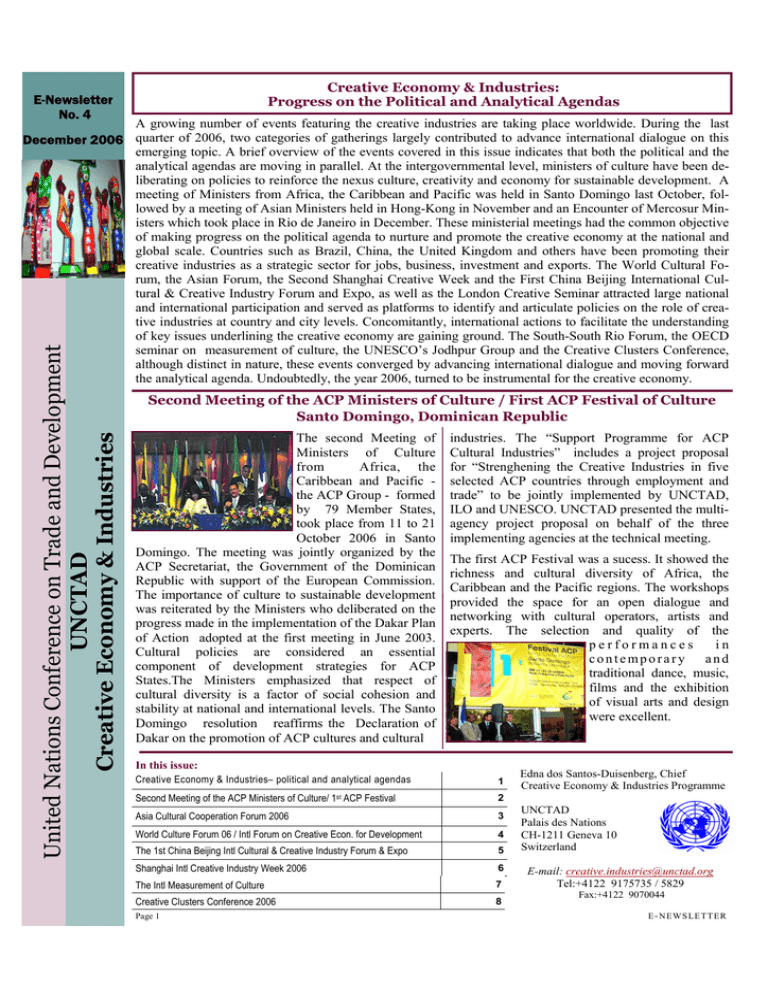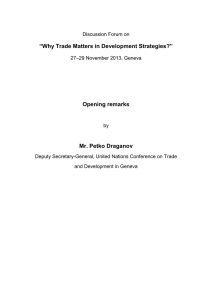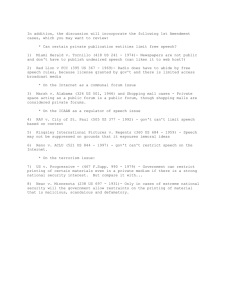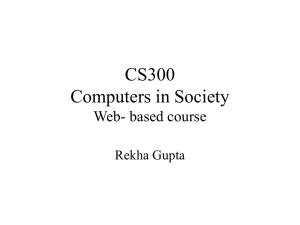Creative Economy & Industries: Progress on the Political and Analytical Agendas E-Newsletter
advertisement

Creative Economy & Industries: Progress on the Political and Analytical Agendas E-Newsletter No. 4 United Nations Conference on Trade and Development UNCTAD Creative Economy & Industries A growing number of events featuring the creative industries are taking place worldwide. During the last December 2006 quarter of 2006, two categories of gatherings largely contributed to advance international dialogue on this emerging topic. A brief overview of the events covered in this issue indicates that both the political and the analytical agendas are moving in parallel. At the intergovernmental level, ministers of culture have been deliberating on policies to reinforce the nexus culture, creativity and economy for sustainable development. A meeting of Ministers from Africa, the Caribbean and Pacific was held in Santo Domingo last October, followed by a meeting of Asian Ministers held in Hong-Kong in November and an Encounter of Mercosur Ministers which took place in Rio de Janeiro in December. These ministerial meetings had the common objective of making progress on the political agenda to nurture and promote the creative economy at the national and global scale. Countries such as Brazil, China, the United Kingdom and others have been promoting their creative industries as a strategic sector for jobs, business, investment and exports. The World Cultural Forum, the Asian Forum, the Second Shanghai Creative Week and the First China Beijing International Cultural & Creative Industry Forum and Expo, as well as the London Creative Seminar attracted large national and international participation and served as platforms to identify and articulate policies on the role of creative industries at country and city levels. Concomitantly, international actions to facilitate the understanding of key issues underlining the creative economy are gaining ground. The South-South Rio Forum, the OECD seminar on measurement of culture, the UNESCO’s Jodhpur Group and the Creative Clusters Conference, although distinct in nature, these events converged by advancing international dialogue and moving forward the analytical agenda. Undoubtedly, the year 2006, turned to be instrumental for the creative economy. Second Meeting of the ACP Ministers of Culture / First ACP Festival of Culture Santo Domingo, Dominican Republic The second Meeting of Ministers of Culture from Africa, the Caribbean and Pacific the ACP Group - formed by 79 Member States, took place from 11 to 21 October 2006 in Santo Domingo. The meeting was jointly organized by the ACP Secretariat, the Government of the Dominican Republic with support of the European Commission. The importance of culture to sustainable development was reiterated by the Ministers who deliberated on the progress made in the implementation of the Dakar Plan of Action adopted at the first meeting in June 2003. Cultural policies are considered an essential component of development strategies for ACP States.The Ministers emphasized that respect of cultural diversity is a factor of social cohesion and stability at national and international levels. The Santo Domingo resolution reaffirms the Declaration of Dakar on the promotion of ACP cultures and cultural industries. The “Support Programme for ACP Cultural Industries” includes a project proposal for “Strenghening the Creative Industries in five selected ACP countries through employment and trade” to be jointly implemented by UNCTAD, ILO and UNESCO. UNCTAD presented the multiagency project proposal on behalf of the three implementing agencies at the technical meeting. The first ACP Festival was a sucess. It showed the richness and cultural diversity of Africa, the Caribbean and the Pacific regions. The workshops provided the space for an open dialogue and networking with cultural operators, artists and experts. The selection and quality of the performances in contemporary and traditional dance, music, films and the exhibition of visual arts and design were excellent. In this issue: Creative Economy & Industries– political and analytical agendas 1 Second Meeting of the ACP Ministers of Culture/ 1st ACP Festival 2 Asia Cultural Cooperation Forum 2006 3 World Culture Forum 06 / Intl Forum on Creative Econ. for Development 4 The 1st China Beijing Intl Cultural & Creative Industry Forum & Expo 5 Shanghai Intl Creative Industry Week 2006 6 The Intl Measurement of Culture 7 Creative Clusters Conference 2006 8 Page 1 Edna dos Santos-Duisenberg, Chief Creative Economy & Industries Programme UNCTAD Palais des Nations CH-1211 Geneva 10 Switzerland E-mail: creative.industries@unctad.org Tel:+4122 9175735 / 5829 Fax:+4122 9070044 E- N EW S LE TT ER Asia Cultural Cooperation Forum 2006 Hong Kong, China This Forum was held in Hong Kong from 9 to 12 November, organized by the Hong Kong Special Administrative Region and partners. The objective was to foster regional cultural cooperation, share practices and promote culture, the arts and creative industries. At the same time it facilitated partnerships between governments and private sector initiatives. The Forum was also an instrument for enhancing Hong Kong’s profile as the cultural and creative hub of Asia. This year, the theme was “Asia Arts, Culture and Modernity” featuring the transformation of Asia’s c u l tu re s. U N E S C O Regional Office for Asia and the Pacific has been collaborating with the Asian Forum and the University of Hong Kong and organized a session on “Measuring Creativity, Happiness and WellBeing”. Among the very thoughful presentations and ideas put forward where the Bhutan’s attempt to benchmark Gross National Happiness, “The Happy Planet Index” the “Creative Index” as well as “The structure of a Well-Being Index” . Lively debates involving the presenters, commentartors and the public followed. UNESCO Regional Office in collaboration with the HongKong University also organized a private meeting of the UN Inter-Agency Technical Working Group on Culture Industry Statistics in Asia and the Pacific to follow-up on the Jodhpur Initiatives for Promoting Cultural Industries in the Asia-Pacific Region, as a strategy for poverty reduction and community vitalization. This group is chaired by UNESCO’s Institute of Statistics and has been working on the framework for national capacity building projects to collect data on cultural industries. Mapping of the craft sector is an important area of work of the Group. It was agreed that effective policy instruments are only possible if it is based on accurate and reliable data, as a pre-requisite for an analytical understanding of the impact of cultural industries on economic and social development. World Culture Forum 2006 International Forum on Creative Economy for Development Rio de Janeiro, Brazil The World Culture Forum was held from 24 November to 3 December in Rio de Janeiro and Salvador, Brazil. It was hosted by the Brazilian Government and organized by the Forum Committee jointly with several partners. This initiative was born from a civil society movement with the aim to create a space for stimulating discussions and exchange of experiences on the universe of culture. The theme was: Identity, Diversity and Development. The program included a number of seminars, workshops, exhibitions and performances. One of the main events was the four-day International Forum on Creative Economy for Development organized by the UNDP—Special Unit for South-South Cooperation. More than 40 international experts participated on the debates, addressing issues on the multiple dimensons of the creative economy, its relation with intellectual property rights and the possibilities for expanding markets. The President of the Forum, Minister of Culture of Brazil, opened the debates pointing out that culture in the contemporary world has three dimensions: the symbolic, the economic and the access to citizenship. Page 2 Among the highlights of the Forum was the strong and active participation of NGOs, particularly those involved in solidarity work with poor minorities leaving in disadvantaged communities. The Forum provided the opportunity to present the initial results of a pilot south-south project sponsored by the UNDP– Special Unit for South-South Cooperation based on creative economy principles of sharing experiences, involving two NGOs from Africa namely Lake Victoria and Nyanza Creative Arts Association (LAVINCA) from Kenya and Maison de Jeunes from Rwanda and the Ação Comunitaria do Brazil (ACB). An art exhibit showed visual arts and fashion products made of batik. Followed by a colourful show rich in costumes, dance, rhythm and percussion was performed by members of the Rwandan National Ballet and ACB’s Orquestra of Berimbau. The show brought joy to the public and hope for new opportunities for African and Brazilian dancers, musicians, choreographers, serigraphs, stylists, cultural producers... U N ITED N ATIO N S C O N FER EN C E O N TR AD E AN D D EV E LO PM E N T The First China Beijing International Cultural & Creative Industry Forum & Expo Beijing, China The Forum was held from 10 to 14 December 2006, hosted by the Ministry of Culture of China, the State Administration of Radio Film and Television, the General Administration of Press and Publication of China, and the People’s Government of Beijing Municipality. The event organized by the China Council for the Promotion of International Trade, responded to the decision of the 11th Beijing Municipality Committee to put forward the cultural and creative industries as one of the pillars of China’s capital economic development in the future. UNCTAD was invited to address the opening of the Cultural and Creative Industry International Forum. In the speech it was emphasized that China has been an example of how to optimize the potentialities of its traditional cultural expressions with technological tools of the contemporary globalized world. Digital animation, publishing, visual arts, design and art crafts range among its most competitive creative items, placing China as the third major exporter of creative products and services, leading Asian exports in this dynamic creative sector. China exports - selected creative industry products 4 Billion US$ 3 .5 3 2 .5 2 1. 5 1 0 .5 0 V i sual ar t s 19 9 6 2004 Pub li shing D ig i t al i nd ust r y The opening of this international event at the Great Hall of the People was grandiose. A show of performing arts combining cultural traditions such as the Beijing opera, folk songs, acrobatic troupes with modern ballet and pop singers was a beautiful sample of the richness of China’s cultural diversity and creativity. The theme of the Expo was «Creativity, Science & Technology and Culture », more than 40 activities were organized in the various modules of the Expo devoted to specific creative sectors : Performing Arts; Traditional Crafts; Radio and TV broadcasting ; Film and Digital Animation; Publishing and Printing and Trade Fairs. The Expo was specifically designed to promote interactions among entrepreneurs from the creative industries and enhance international cooperation. A total of 1,500 cultural and creative national and international enterprises took part in the Expo at the China International Exhibition Center. Source: UNCTAD Shanghai International Creative Industry Week 2006 Shanghai, China The second Shanghai International Creative Industry Week was organized by the Shanghai Creative Industry Center with support from the Shanghai City Government and took place from 22 to 28 November 2006. The event aimed at promoting creative businesses and joint projects, exhibiting the latest achievements of Shanghai creative industry, facilitating international network while providing a platform for trade and international cooperation. Around 50 events were organized around three axes: the Creative Industry Expo; the International Forum and the Creative Design Competition. The Creative Week attracted key players from major creative cities in the world. The occasion also marked the inauguration of the Creative Research Center and the Avenue of Creativity with new clusters. In the International Forum on Urban Creative Industry, on 23 of November, UNCTAD was invited to take part with a keynote speech entitled: Creative Economy, Fostering Cities Development. For UNCTAD, Shanghai is leading the group of creative cities in Asia. Home to a population of 18 E- N EW S LE TT ER million, the urban modernization of Shanghai and the emphasis placed on technology-oriented services has greatly contributed to attract creative investments and business to the city. In 2005, 6% of Shanghai’s GDP originated from the creative industries. A good mix of past traditions, present technologies and futuristic vision are the ingredients of Shanghai’s prosperity. Architecture, design, fashion, publishing and new media are the drivers of Shanghai's creative economy. The city became a showcase of how to combine modern architecture and design with aesthetics and effectiveness. Shanghai is a remarkable example of rapid expansion of creative clusters. Efforts have been made to preserve cultural heritage while regenerating old districts. Nowadays nearly 70 clusters are operational contributing to improve the living standards and living environment of the population. Page 3 The International Measurement of Culture Paris, France A workshop on “International Measurement of Culture” was held on 4-5 December at the OECD, organized by the Statistics Directorate. About 60 experts from OECD member States, international organizations and academia participated. The objective was to share the preliminary results of work being carried out under a new project on the economic and social importance of culture for OECD countries. Debates aimed at getting insights and exchange information regarding existing methodologies and current limitations for collecting comparable cultural statistics at international and national levels. A review was made of work in progress in the field of cultural statistics by international institutions particularly EUROSTAT, UNESCO and UNCTAD, as well as some country experiences. New models and empirical research being carried out by universities were also presented. Issues related to non-economic indicators, industry and trade data, culture satellite accounts, public expenditures and classification systems were discussed. UNCTAD emphasized the current difficulties in analyzing the economic potential of the creative economy in developing countries due to lack of comparable and reliable data. The limitations of customs data and current methodologies to capture trade flows on creative services, the discrepancies among classification codes and definitions, the lack of universal practices to measure creative content across sectors and countries are issues to be tackled. Experts agreed that international agencies should collaborate to avoid duplication and move further the statistical cultural and creative agenda. Creative Clusters Conference 2006 Newcastle Gateshead, UK The Creative Clusters 2006 took place in Newcastle Gateshead, from 5 to 8 November focusing on the theme “Mainstreaming Creativity”.This international gathering has been contributing to raise the debate on the role that creative industries can play for socio-economic and cultural development. In the first years discussions were mainly on developments in the United Kingdom but on its fourth edition, participation and debates became more international. Alongside with the conference the programme offers several events including workshops, and project visits. In this context, a seminar on the “Introduction to UK Creative Industries Policy” was held at the Department for Culture, Media and Sport in London. Senior officials presented an overview of creative industries development strategies at national and regional levels. Debates were followed by a tour to London creative projects showing practical examples of local-level and sector-specific public and private interventions. The choice of Newcastle in North East England to convene the conference was interesting to showcase how the culture and creative industries can help to regenerate a declining industrial area. Today, the North East region is also a major center for the production of computer games. Participants had the opportunity to learn from each other. UNCTAD made a presentation on the topic “Creative industries: a new dynamic sector in world trade” emphasizing the potential of creative industries for trade gains in developing countries. Upcoming UN - Creative Industries Events: Events Workshop on the Management of Intellectual Property in the Publishing Industry Date 15 / 16 February 2007 City, Country New Delhi, India Best Seaso nal Greetin gs & A successfu l Creative Year 20 Website / contact www.wipo.int Agency WIPO Federation of Indian Publishers Ministry of Human Resource Contributions for the quarterly editions of the UNCTAD Creative Economy & Industries E-Newsletter 07 Text and photos by Edna dos Santos Editing and layout: Erika Machacek Dissemination: Clisse Medeiros Ramos Page 4 U N ITED N ATIO N S C O N FER EN C E O N TR AD E AN D D EV E LO PM E N T






